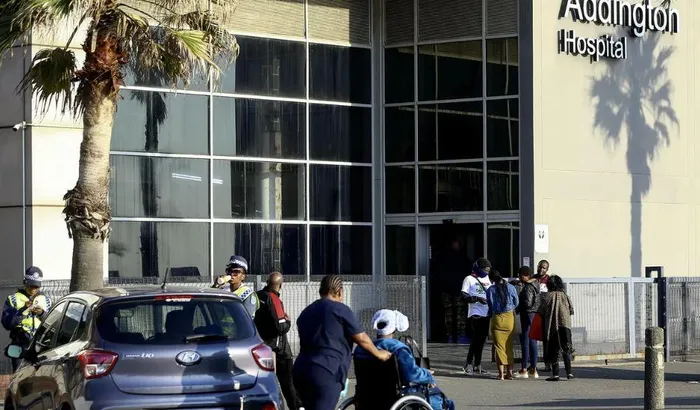South Africa's healthcare under siege: undocumented immigrants blocked

Anti-immigrant campaigners turn away people seeking medical assistance at Durban's Addington Hospital, while the city's metro police ticket motorists, oblivious to what is going around them
Image: Leon Lestrade
Ongoing tensions surrounding immigration and healthcare access in South Africa continues to bubble under, as a Congo national came to terms with this development in Durban this week.
Christian Tchizungu Kwigomba's routine visit to Addington Hospital turned into a distressing outing when he was barred from entering the facility.
Kwigomba faced physical intimidation, not from hospital security, but from members of the self-appointed March on March Movement, who are enforcing their controversial mandate against undocumented immigrants.
This group has taken it upon themselves to monitor the entrance of the hospital, demanding identification from anyone seeking medical attention, effectively turning away those who cannot provide proof of South African citizenship.
The group’s message was uncompromising: public healthcare, they asserted, was solely for South Africans who can produce an ID.
Kwigomba lamented, “I faced something that no human being should experience. Even pregnant women are being turned away. It’s a matter of life or death.”
His own health was precarious; as a diabetic reliant on medication.
He feels the strain of being turned away: “We are just waiting to die.”
Teresa Nortje, chairperson of the March on March Movement, defended the group’s actions, claiming, “We’ve had an influx of undocumented immigrants who falsify papers…the country’s hospitals are for South Africans who pay tax.”
However, while she cites the Constitution to support her stance, her actions contradict Section 27, which guarantees healthcare access to all individuals in South Africa, regardless of immigration status.
Last week, the group’s aggressive tactics attracted further scrutiny after they were seen on film forcibly removing 77-year-old Crispin Hemson, a well-respected activist, for refusing to show them his ID.
In response, KwaZulu-Natal Health MEC Nomagugu Simelane Mngadi condemned the group's actions as “unlawful acts of vigilantism,” reiterating that “no member of the public or structure has the legal or moral authority to block others from accessing healthcare.”
The Department of Health has echoed the concerns, with spokesperson Foster Mohale urging that such protests must occur “within the confines of the law.” He stressed that endangering lives by violating constitutional rights was unacceptable: “Everyone has the right to emergency and primary care.”
In light of these incidents, heightened security measures are being implemented to safeguard both patients and health workers at medical facilities.
The South African Police Service, alongside the Department of Health, was deploying public order units to ensure that law and order prevail throughout the protests.
Acting government spokesperson, Nomonde Mnukwa, reiterated a zero-tolerance stance against vigilante behaviour. “Taking the law into one’s own hands is unacceptable and undermines the values enshrined in our democratic Constitution,” she stated.
The South African Human Rights Commission (SAHRC) also weighed in, noting that access to healthcare was a right embedded in the Constitution, without discrimination based on nationality or legal status.
They affirmed that all individuals, including refugees, asylum seekers, and even undocumented migrants, are entitled to basic health services.
“Emergency healthcare must be provided unconditionally by both public and private health facilities,” the commission said
DAILY NEWS.
Related Topics: